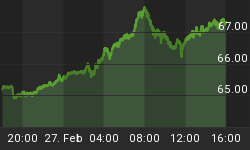Close to Collapse: Bailed-Out Banks Facing Bankruptcy
We want to trust in the financial stability of our bank. After all, most of us have money in these institutions.
In spite of our wishful thinking, the tide of bank failures has not stopped. And these failures are occurring well after the heart of the financial crisis -- and even after some of these banks received bailouts.
"Nearly 100 U.S. banks that got bailout funds from the federal government show signs they are in jeopardy of failing.
The total, based on an analysis of third-quarter financial results by The Wall Street Journal, is up from 86 in the second quarter, reflecting eroding capital levels, a pileup of bad loans and warnings from regulators.
The 98 banks in shaky condition got more than $4.2 billion in infusions from the Treasury Department under the Troubled Asset Relief Program."
Wall Street Journal (12/26)
Seven of the 98 small banks mentioned have already failed.
In the U.S. so far this year, 157 banks have failed -- that's the highest number since 1992.
More failures are likely because many banks are burdened by questionable "assets" and bad real estate loans.
"...your money is only as safe as the bank's loans. In boom times, banks become imprudent and lend to almost anyone. In busts, they can't get much of that money back due to widespread defaults.
If the bank's portfolio collapses in value, say, like those of the Savings & Loan institutions in the U.S. in the late 1980s and early 1990s, the bank is broke, and its depositors' savings are gone."
Conquer the Crash, 2nd edition, pp. 175-176
Yes, the Federal Deposit Insurance Corporation (FDIC) insures depositors, but the question is: Does the FDIC have the wherewithal to "make whole" all depositors if scores of banks go under at the same time? Here at Elliott Wave International, we do not recommend that you count on the FDIC. Here's why:
"...did you know that most of the FDIC's money comes from other banks? This funding scheme makes prudent banks pay to save the imprudent ones, imparting weak banks' frailty to the strong ones.
When the FDIC rescues weak banks by charging healthier ones high 'premiums,' overall bank deposits are depleted, causing the net loan-to-deposit ratio to rise.
The result, in turn, means that in times of bank stress, it will take a progressively smaller percentage of depositors to cause unmanageable bank runs."
Conquer the Crash, 2nd edition, p. 177
Are some banks safer than others? We think so.
"Hope is not a strategy." If you plan to have money on deposit at a bank, we suggest reading our FREE report, "Discover the Top 100 Safest U.S. Banks." This 10-page bank safety report is available to you after you become a Club EWI member.
Inside the revealing free report, you'll discover:
- The 100 Safest U.S. Banks (2 for each state)
- Where your money goes after you make a deposit
- How your fractional-reserve bank works
- What risks you might be taking by relying on the FDIC's guarantee
Please protect your money. Download the free 10-page "Safe Banks" report now. Learn more about the "Safe Banks" report, and download it for free here.
This article was syndicated by Elliott Wave International and was originally published under the headline Is Your Bank on the "100 Safest" List? Maybe You Should Find Out. EWI is the world's largest market forecasting firm. Its staff of full-time analysts led by Chartered Market Technician Robert Prechter provides 24-hour-a-day market analysis to institutional and private investors around the world.















